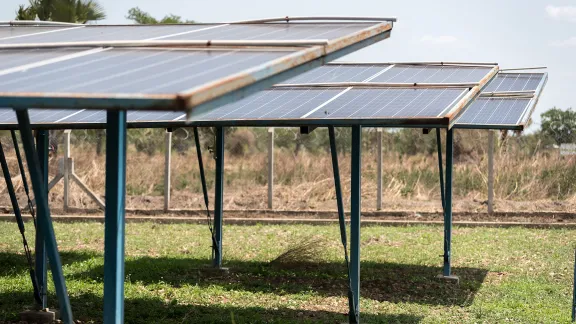
Solar panels for a solar-powered motorized water pump in Orinya village, Palorinya settlement in Uganda. The LWF uses 14 hybrid solar-powered water pumps and an additional 152 hand-pumped boreholes to provide water for refugees. Photo: LWF/Albin Hillert
“Climate change affects every corner of the world”
(LWI) – “My passion for climate justice makes me have a different worldview regarding all creation. The church must be involved in this work,” says Kwanele Ncube, pastor and dean of the Evangelical Lutheran Church in Zimbabwe. “The desire to be an advocate for climate justice led me to this program.”
The Lutheran World Federation (LWF) and the Center for Climate Justice and Faith of the Pacific Lutheran Theological Seminary (PLTS) are offering a non-degree learning program on climate justice and faith for the second time. Applications are open until 10 June for interested persons from LWF member churches, both lay and ordained. Upon completing the online study program, participants will receive a certificate in climate justice and faith.
Ncube is one of the 30 students representing ten countries and ranging in age from 21 to 70 who participated in the first course in 2021.
Learning together across continents and generations
“We especially encourage applicants from populations most affected by climate change,” says Elena Cedillo, LWF’s Program Executive for Climate Justice. “Anyone interested in learning about and acting on faith-based initiatives to engage in climate justice work within their context – and who wants to explore spiritual grounding for that work – will benefit from this opportunity.”
“This certificate offers a cohort-based, online trans-contextual curriculum that empowers participants to cultivate a moral, spiritual, and practical capacity for leadership in the work of climate justice within their communities,” adds Rev. Dr. Chad Rimmer, LWF Program Executive for Identity, Communion and Formation. Topics covered include theology, ethics, and spirituality related to climate justice; climate change knowledge; and social change practices that connect ecological well-being with racial, economic, and gender justice.
People of faith acting for climate justice
“Working with the other students has made me realize that, while the climate change that affects my area is not known to some,” says Ncube. “Climate change has affected almost every corner of the world in one way or another.”
“The course has caused me to be more sensitive to the unequal and unjust distribution of climate change effects on various populations. In addition, hearing from other students has given me a perspective on how privileged we are in the United States,” says Deborah White, a US journalist from Reno, Nevada, who also completed the program.
Oinike Natalia Harefa is a lecturer at The Protestant Christian Church (BNKP) Sundermann Theological Seminary in Nias, Indonesia. “I teach missiology,” she says. “In my class, I always include the subject of ecology because I believe that protecting the earth is a sacred calling of the church. This certificate program has helped me see that, even though women, Indigenous peoples, and young people are often the frontline victims of climate change, governments often do not embrace them as subjects in making important environmental decisions.”
Putting faith into action
Upon completing the course, participants engaged in climate action in their region and communities.
Ncube has already planted trees on a small scale. “This is the work I will continue to pursue after I finish the certificate since my region is fast becoming a desert due to deforestation.”
White plans to develop a two-part curriculum for all ages on Christian responsibilities to care for God’s creation and launch a website on climate news.
In addition to teaching, Harefa has found other ways to share more about ecology and the church’s calling to protect the earth. “This semester, I wrote an academic article on ecological damage. I also write and share poems on climate justice on social media,” she says.
Details and applications
The second program runs for 15 weeks starting on 5 September 2022 and will reconvene for another 15 weeks in May 2023. Applications can be submitted online until 10 June. Scholarships are available based on need.
Both Cedillo and Rimmer serve as learning guides, accompanying participants.
By LWF/A. Weyermüller


